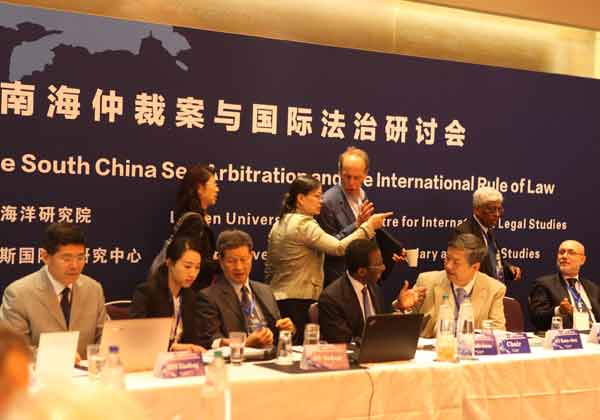South China Sea tribunal has no legal validity
By Fu Jing in the Hague, the Netherlands (chinadaily.com.cn) Updated: 2016-06-27 15:21
 |
|
Leading international law experts said any verdict by the Arbitral Tribunal on the South China Sea will be of no legal validity, at a seminar on the South China Sea Arbitration and International Rule of Law in the Hague on Sunday. [Photo by Fu Jing/chinadaily.com.cn] |
The experts, some of whom were even drafting the United Nations' international convention on the sea, discussed the issue at a seminar on the South China Sea Arbitration and International Rule of Law in the Dutch city, where the Permanent Court of Arbitration (PCA)'s Arbitral Tribunal is assessing the dispute case filed unilaterally by the Philippines.
The experts spoke to China Daily at the sidelines of the one-day seminar, organized by Leiden University's Grotius Center for International Legal Studies and Wuhan University's Institute of Boundary and Ocean Studies from Central China. They said the PCA had no jurisdiction of sovereignty dispute under the framework of the United Nations Convention on the Law of the Sea (UNCLOS).
They also said the related parties had not entered into an agreement to allow the tribunal to conduct such arbitration.
According to them, these are two essential preconditions for the PCA to exercise the arbitration.
"So China has held the right stances of non-participation and non-acceptance in the dispute arbitration, which has been stirred up mainly due to the geopolitical strategy of other power in the region," said Abdul Koroma, former judge of the International Court of Justice, the principal judicial organ of the United Nations, based in the Hague.
Koroma said the PCA didn't obtain an agreement from the related parties to conduct the arbitration, which is a precondition required under United Nations law.
"On this case, the Arbitral Tribunal has no such authority simply because not all of the related parties have agreed to authorize to evoke the arbitration," said Koroma, who was previously the Sierra Lenone ambassador to the United Nations and European Union.
"Only the Philippines has filed the case of arbitration and it is one-sided," he added. "So there lacks in authority, in accordance to the international law."
The South China Sea has been owned by China since ancient times and now the Philippines and Vietnam have occupied some islands and reefs in the region. China has repeatedly insisted that the related parties should solve the dispute through negotiation, but the Philippines initiated the South China Sea arbitration against China at the Permanent Court of Arbitration in The Hague in early 2013.
"It is right for China not to accept arbitration and any verdict of the PCA," Koroma said. "This is very clear."
Koroma said he was echoing on calls from other experts attending the seminar, insisting the international law should not be used for some countries to achieve their objectives of foreign policies.
At the seminar, many experts have opposed efforts by the US, which is not a direct party involved in the South China Sea issue, to support the Philippines in the region to achieve its foreign policy goals of of realizing a strategic re-balance in the Asia-Pacific region, by containing China.
"The United States should not get involved because it is not a direct stakeholder of this issue. I suggest that this is a issue for the countries in the regions to seek solution through negotiation," said Tom Zwart, a School of Law professor at the Utrecht University in the Netherlands.
Zwart said he didn't mean to take sides in the dispute but he insisted that the United States should not use the rule of international law to serve its foreign policy agenda, because in recent years the country had returned to the Asia-Pacific region to boost its strategic presence.
"Instead, I believe the best way is to go back to negotiation table in an Asian way," said Zwart, who worked as senior counsel to the Dutch deputy prime minister.
He said that from historic perspectives, China and the Asian countries had for centuries been sorting out their differences in a way which was mutually agreeable, and that they would still be able to for centuries more.
"Regarding to the complexity of this dispute, with so many parties and interests .involved, you could not deal with it within a framework of the United Nations Convention on the Law of the Sea (UNCLOS), because treaty does not offer procedures to solve the problem," Zwart said. "So China and its neighbors must sit down to discuss the solutions by themselves."
Sreenivasa Rao Pemmaraju is a famous international lawyer who has served as chief legal adviser in India's Ministry of Foreign Affairs. He says China has a lot of evidence to indicate its ownership of the islands and reefs in the South China Sea.
"I am very glad that Chinese experts have brought so much ancient evidences and materials to show its ownership and jurisdiction of the South China Sea at the seminar, which will help people know more about what the case is about," said Pemmaraju, who is also chair of the UN International Law Commission. "There should be nothing shy of this."
But he said the problem was that some documents were in Chinese and it took more time for people like him to know more about the truth behind it.
"This is the beginning of dialogue and this will help the Philippines understand the reasons behind China's stances on the dispute," Pemmaraju said. "The eventually, the case will be sort it out as the related parties know more the origins."
He has called for more confidence and trust building among the Asian communities because historically, the countries had been colonies of the West. "And now we are developing countries and we have many poor people in China, India and the Philippines," he said. "We have to show our sympathy to each other. We have long way to go and we must save energy and focus on development."
Pemmaraju said China now had played a big and responsible role in the world. "China has not brought trouble to anybody else and China has great stake in peace," he said.
At the sideline of the Sunday seminar, Nico Schrijver, academic director of the Leiden University's Grotius Center for International Legal Studies, said the big powers, such as the United States, should be prevented from getting involved in the South China Sea disputes and these should be solved by the claimant countries.
"China has very long tradition of peaceful settlements of international disputes and we could like to learn from China," said Schrijver, who is professor of peace, human rights and sea dispute settlement. "Maybe I am the only one born in the sea level today and sea is so important for us and you have to cooperate with your neighbors."
Abraham Sofaer, senior fellow at the Stanford University Hoover Institution in the US, said arbitration, raised by the Philippines but refused by China, has brought a lot of difficulties and anxiety, which were not good for any parties.
"We (The US) should be more responsible in talking to our ally get back to the status quo and get this dispute resolved in peaceful way," Sofaer said, adding that the dispute between China and the Philippines had let him know the limit of the international laws.
Sofaer said the public in the United States could not easily access balanced reporting from the media, as they intended to play up conflict. "It is happening every day in the South China Sea dispute, which been reported as negative, counterproductive, aggressive action from China," Sofaer said, adding that it was misleading.
Sofaer suggested the related parties should learn from the wisdom of late leader Deng Xiaoping's in calling for assuming sovereignty and setting issue aside to pursue the joint development.. "We should pursue such call," said Sofaer.
"And the US, should convince the its ally to curb the harm its litigation has caused by finding a way to restore the status quo with China at a bargaining table," he said. "And I believe it will withdraw the appeal to the arbitral turbine because the judgments of tribunal could not be enforced finally."
Voices of China's scholars
Hu Dekun, Dean at Wuhan University's China Institute of Boundary and Ocean Studies, said China could offer mountains of documents, records and historic heritages to prove that since ancient times, Chinese people had discovered and used the South China Sea islands and reefs.
"Our ancestors have been fishing and trading on the regions and successively, China has owned the sovereignty and exercising the jurisdiction over the South China Sea islands," Hu said.
Despite the Philippines and the Vietnamese occupying some islands in the South China Sea, China has refrained from raising disputes. "But in the recent years since the United States has returned to the region, the Philippines have begun to claim the sovereignty of the islands, which are owned by China, and this is the very nature of the dispute," Hu said.
But Liu Huawen, assistant director at the Institute of International Law of the Chinese Academy of Social Sciences, said China had enough legitimate rights under international law to refuse to accept the arbitration, which was unilaterally initiated by the Philippines.
Meanwhile, the tribunal has no jurisdiction over the Philippines' territorial claims to several islands or rocks, because when ratifying the UNCLOS in 2006, China had the right to opt out of various clauses. It did so for compulsory arbitration of maritime boundary delimitation and historical rights by the tribunal.
"So I think any verdict from the tribunal is invalid and the Philippines should come to negotiation table with China to solve the dispute and the US should stop from help escalating intentions in the region right now," Liu said.
- Quotable quotes on South China Sea arbitration concerning US role
- CPC calls for impartial media coverage of South China Sea
- Pakistan says firmly supports China on South China Sea issue
- S. Africa voices concern over South China Sea situation
- Why China says no to arbitration over South China Sea
- Philippines says no war with China over South China Sea







